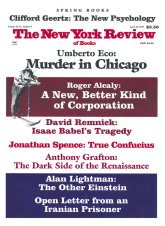In response to:
Goldhagen in Germany from the November 28, 1996 issue
To the Editors:
Rather than dealing with the basic question that I raised in my essay: How do we explain the different receptions of Hitler’s Willing Executioners in the United States, Israel, and Germany, and in particular, how do we explain Goldhagen’s hysterical at first and then “triumphal” German reception, Josef Joffe [NYR, November 28, 1996] takes me (and Dan Diner) to task for allegedly describing the “Holocaust as a Peeping Tom’s Paradise.” This is patently false, and Joffe has quoted me out of context. Here is what I wrote:
…Unlike any previous study about the Holocaust, Hitler’s Willing Executioners presents, first of all, a pornography of horror: detailed accounts of the most undescribable cruelties that the “ordinary Germans” have committed against Jews. More still, Goldhagen promises us a book “from the perspective of the perpetrators,” he guides our hand, on the trigger of a gun, or holding a whip. It is pornography also in the sense that sexuality and murder are brought into indirect or direct association, that the pleasure derived from the perpetrators’ killing and torturing is brought before our eyes…. These portrayals are one [of three major] reason[s] for his success; they endow the book with a voyeurist narration, projected into the national sphere, and on account of which continued reading appears to be made worthwhile. (Die Tageszeitung, 7 August 1996)
Indeed, on purely scholarly, methodological grounds, Goldhagen’s strategy of heaping accounts of bestial Nazi atrocities one upon the other—and letting the readers experience these from the perspective of the perpetrators who derived pleasure from it—cannot possibly be justified. What other purpose, then, could this barrage of accounts of barbarism serve? They are, pure and simple, exploitative and pornographic. I stand by what I have written.
In his conclusion, Joffe, who helped promote Goldhagen’s tour through Germany, congratulates his German compatriots for their “triumphal” reception of Goldhagen during his German tour. He finds this “reassuring.” While Germany today is no more anti-Semitic than most other Western European countries, I would nevertheless be more skeptical. The fact that the German press cautiously veered towards a positive evaluation of Goldhagen, in a German variant of PC, does not tell us anything about the silent resentment about “German bashing” felt by the majority of Germans; the fact that thousands of mostly younger Germans applauded Goldhagen’s appearances, while very positive, should therefore be taken with a grain of salt. We only have to remember the similarly massive commotion in Germany following another US import—the airing of the “Holocaust” TV series in early 1979. Only a few short years thereafter, we witnessed the Fassbinder Affair, Bitburg, and a range of anti-Semitic musings by persons in public life. I would therefore agree here with Countess Dönhoff whom he, together with most other German critics, dismissed, at times contemptuously: Dönhoff warned of a revival of anti-Semitism in Germany. I find the hysterical reception of Goldhagen in Germany not “reassuring” at all. “Bewildering” would be more to the point.
Y. Michal Bodemann
University of Toronto
Josef Joffe replies:
I am not sure Professor Bodemann is his own best defense counsel. My article devotes a total of two sentences to him, to wit:
Michal Bodemann…went one worse in the Berlin Tageszeitung. “This is pornography,” he wrote, because [Hitler’s Willing Executioners], written from the perspective of the killers, drives home the “pleasure derived from murder and torture” in a “voyeuristic narration.”
To which I appended the rhetorical question: “The Holocaust as a Peeping Tom’s paradise?”
Oddly, the full context, as provided by his letter, merely confirms my point at greater length, i.e., that he regards the book as pornography. He is certainly entitled to that opinion; but he should not complain that it was wrongly attributed to him.
He also faults my interpretation of the events. While I describe the reception of Goldhagen in Germany as “reassuring,” he calls it “hysterical.” If thousands of “willing listeners” (plus possible millions who watched the debates on TV) prove “hysteria,” then, I guess, the country is gaga. But this would be quite an original definition of hysteria.
Apparently, Professor Bodemann sees or foresees a revival of anti-Semitism in Germany. In response, I would cite one fact: 165,000 copies of Goldhagen’s book were sold by Christmas. Should we conclude that all these soi-disant anti-Semites shelled out forty dollars for the “pleasure” of reliving—or reading about—the “perpetrators’ killing and torturing” of Jewish Untermenschen? Or, alternatively, that they did so to find out how Goldhagen, the Jewish enemy, had besmirched the Fatherland?
Let’s hope that charges of German anti-Semitism will never be less absurd than that.
This Issue
April 10, 1997



